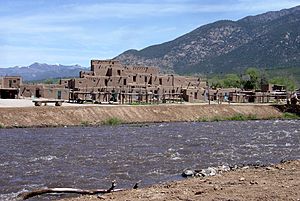Albert Looking Elk facts for kids
Quick facts for kids
Albert Looking Elk
|
|
|---|---|
| Born |
Albert Martinez, T'o'nu
c. 1888 |
| Died | November 30, 1940 New Mexico
|
| Nationality | Taos Pueblo |
| Known for | landscape, architectural, and mythological painting |
|
Notable work
|
View of Taos, Burrows at Taos Pueblo |
| Awards | First place, SWAIA, 1923 |
| Elected | Governor of Taos Pueblo, 1938 |
| Patron(s) | Mary Cabot Wheelwright |
Albert Looking Elk (born around 1888 – died November 30, 1940) was a talented Taos Pueblo painter. He was also known as Albert Martinez. Looking Elk is famous for being one of the "Three Taos Pueblo Painters" who shared their community's stories through art.
Contents
About Albert Looking Elk
Albert's father was José R. Martínez. Albert was known by his Taos name, T'o'nu. This name means "Looking Elk." He was born around 1888 in Taos Pueblo, New Mexico.
When Albert was young, he worked as a model for artists. One of these artists was E. Irving Couse. Couse was a founder of the Taos Society of Artists. Albert continued modeling as he grew up. His wife and children also modeled for artists. In 1900, he modeled for Oscar E. Berninghaus. Berninghaus was another founder of the Taos Society of Artists.
In 1915, Albert received a special Christmas gift. It was paints and brushes from Berninghaus. He also got painting lessons. This is how Albert Looking Elk started his own art career. Later, in 1938, he was chosen as the Governor of Taos Pueblo.
The Three Taos Pueblo Painters
Albert Looking Elk is known as one of the "Three Taos Pueblo Painters." The other two are Albert Lujan and Juan Mirabal. As the Taos art colony grew, these men learned to paint. They used oil and watercolor paints. They created art about their own community. Their paintings showed a Native American view of life.
In 2003, their artwork was shown in an exhibition. It was called "Three Pueblo Painters." This show was held at the Harwood Museum of Art in Taos.
Taos Pueblo: An Ancient Home
Taos Pueblo is located in a valley near the Rio Grande. It is the most northern of the New Mexico pueblos. The Taos Indians have lived here for nearly a thousand years. Experts believe the pueblo was built between 1000 and 1450 CE. Some parts were added later.
Taos Pueblo is thought to be the oldest community in the United States. People have lived there continuously for a very long time. The Pueblo buildings can be five stories high. They are made of many homes sharing walls. Over 1,900 people belong to the Taos pueblo community. About 150 people live at the pueblo all year. Others have modern homes nearby. They stay at the pueblo during colder weather.
In 1992, Taos Pueblo became a UNESCO World Heritage Site. This means it is one of the most important historical places in the world. Other famous sites include the Taj Mahal and the Great Pyramids. The Grand Canyon in the United States is also a World Heritage Site.
For hundreds of years, Pueblo painters used natural materials. They painted with tempera, clay, and earth colors. They painted on textiles, walls, pottery, and animal hides. Albert Looking Elk, Albert Lujan, and Juan Mirabal learned new ways to paint. They mastered European painting tools and methods.
Starting His Art Career
Looking Elk took art lessons. By 1917, he received his first set of painting supplies. This included oil paints, an easel, brushes, and canvases. These were gifts from Oscar E. Berninghaus. Berninghaus was a founder of the Taos Society of Artists.
The Taos Valley News wrote about him on July 16, 1918. It said, "Taos has a native artist... Albert [Looking Elk] Martinez of the Pueblo..." The newspaper also noted he had painted many good pictures. He was even able to sell some for a fair price. At first, he earned only a few dollars from his paintings. But he became very successful. He soon bought a Studebaker car. He was the first person from the Taos Pueblo tribe to own an automobile.
Professional Artist
Looking Elk found most of his ideas and subjects in the Taos Pueblo. He often painted the north building of the pueblo. He would paint it from the village plaza. His artworks were very realistic. This was different from the romantic style of the Taos Society of Artists. He was also influenced by the Santa Fe Indian School style. You can see this in some of his works.
Between 1923 and 1930, Looking Elk showed his art many times. He exhibited at the Museum of Fine Arts in Santa Fe. He even won an art award during his first show. His use of light and color made his art very popular.
Death
Albert Looking Elk passed away at Taos Pueblo on November 30, 1940. Some sources list his death year as 1941.


